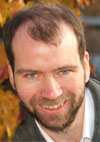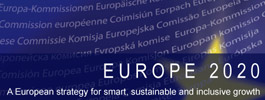by Till Voigtländer, Austrian representative to the Expert Group on Rare Diseases and Expert on the Board of Member States on European Reference networks.

Patients with rare diseases often suffer from something else that can be as disabilitating as their illness. Isolation. The feeling that no one else knows what they are dealing with, that no one knows how to help them, that investments aren't being made to find effective medicines or even a cure because there aren't enough people who need it.
But although it can feel like it, they are not alone. Even if a rare disease is defined as one that afflicts no more than 1 out of 2000 people, collectively, some 6000 types of rare diseases affect a total of 30 million people in the EU.
And just as no one should feel alone facing a rare disease, no one should have to go it alone to find solutions. By working together, we can create a comprehensive databank of information that could be drawn upon for better diagnosis, treatment and support. We can look at our existing knowledge gaps and provide funding for research and development and incentives to pharmaceutical companies to develop drugs for rare diseases. We can establish a network of specialists who can be easily located by patients with special needs.
Not only can we do these things, we are doing them – for more than 15 years with increasing success and significance. Back in 1999, the European Commission launched its first initiative with the elaboration and subsequent adoption by the European Parliament and the Council of Regulation EC 141/2000 on orphan medicinal products, providing clear incentives for the pharmaceutical industry to invest in the development of medicines for RD. This was followed by further activities – and success stories – like the continuous support and co-funding of Orphanet, now the world’s leading reference database for rare diseases, and facilitating its rapid expansion to practically all European Member States and beyond.
Over time, these initiatives brought together more and more key players with their common goal of helping people with rare diseases. As a result, the European Commission is now collaborating closely with Member States, the European Medicines Agency, health care providers, patients and stakeholders including patients’ organisations like EURORDIS, who organise Rare Diseases Day on the last day of February each year to raise awareness. And this type of collaboration is not only taking place outside the Commission, but also inside the institution - the Directorate General for Health and Food safety, is working together with Directorate for Research and Development and both are collaborating with the Commission's Joint Research Centre.
The latest development in connecting multiple stakeholders across Europe, driven by the European Commission is the soon to be finalised establishment of European Reference Networks – with a first call for applications just launched on March 16. These networks are based on the voluntary participation of health care providers throughout Europe and are intended to help patients get easier access to highly specialised care, to encourage European co-operation on highly specialised healthcare and to improve diagnosis and care in medical fields where expertise is rare. The networks will also help Member States with too few patients to provide this type of highly specialised care, help speed up the diffusion of innovations in medical science and health technologies and serve as focal points for medical training and research, information dissemination and evaluation, ultimately lifting health care to an all new level of clinical and scientific networking never before seen in Europe or anywhere else.
Assisting the Commission and its partners by drawing up legal instruments and policy documents and by providing guidelines and recommendations is the European Commission Expert Group on Rare Diseases. This Panel advises the Commission on international co-operation, provides an overview of Union and national policies and organises exchanges of relevant experience, policies and practices between the Member States and the various parties involved.
Still riding the momentum of the most successful Rare Diseases Day event ever – events were held in 85 countries on 29 February 2016 and over 6 million people were reached via Facebook alone – the Expert Group will meet soon on 5 and 6 April in Luxembourg to discuss how to best move forward – together.







